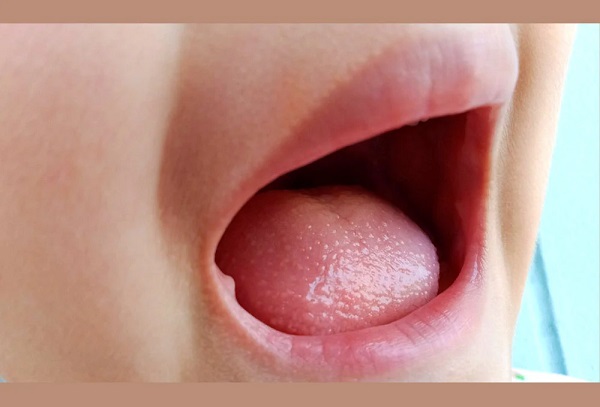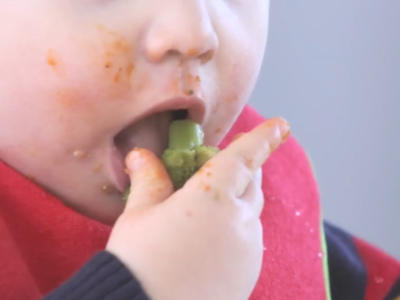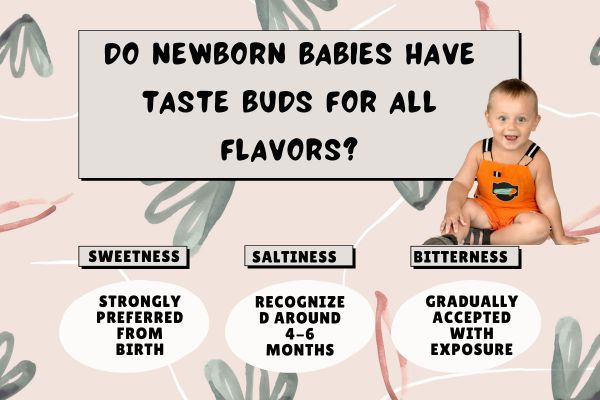“Do newborns have taste buds?” is one of the many questions that come with becoming a parent. Yes, is the response! Newborns are born with taste buds, and their sense of taste starts to develop before they are born. This book will examine the intriguing process of a newborn’s taste development and how parents can support their palate.
You may want to read: How Much Should 16 Month Old Sleep?
- When Do Taste Buds Develop?
- How Do Newborns Experience Taste?
- Step-by-Step Guide to Supporting Taste Development
- Why Is Early Taste Development Important?
- Tips for Expanding Your Baby’s Taste Palate
- Do Newborn Babies Have Taste Buds for All Flavors?
- Final Thoughts on Your Baby’s Taste Journey
- FAQs About Do Newborns Have Taste Buds
When Do Taste Buds Develop?

As early as the eighth week of pregnancy, taste buds start to develop. A baby’s tongue, palate, and other taste-related structures develop during this period. The baby can already taste the flavors of the mother’s food through amniotic fluid by the third trimester.
The answer to the question, “Do newborn babies have taste buds?” is not simply “yes,” but rather, your baby’s taste buds are astonishingly developed by the time they are born.
How Do Newborns Experience Taste?
Newborns are naturally inclined to prefer sweet flavors, which is why they enjoy breast milk or formula. Here are some key insights into how newborns experience taste:
- Preference for Sweetness: Newborns are wired to enjoy sweet flavors because it signals energy-rich nutrients, such as those found in breast milk.
- Rejection of Bitter Flavors: This is a natural survival mechanism that helps them avoid potentially harmful substances.
- Taste Bud Distribution: Unlike adults, babies have taste buds on their tongue, cheeks, and even the back of their throat.
Step-by-Step Guide to Supporting Taste Development

Here’s how you can help your baby explore flavors in a healthy and positive way:
1. Start with Breastfeeding or Formula
Because breast milk is naturally sweet, it gives newborns a safe starting point for their flavor exploration. Your diet may have an impact on your infant’s taste preferences if you are nursing. A newborn may eventually detect the delicate flavors that are introduced by eating a range of healthful meals.
2. Gradually Introduce Flavors
Babies are prepared to begin experimenting with solid foods about six months of age. Start with flavors that are naturally mild, such as mashed vegetables and fruits. Don’t add sugar or salt; this lets the baby enjoy the food’s natural flavor.
3. Be Patient with New Foods

Babies’ first rejection of novel flavors is common. According to studies, a newborn may need 8 to 15 attempts before accepting a new flavor. Don’t give up if your infant initially refuses to eat; perseverance is rewarded.
4. Provide a Range of Foods
Your baby’s taste can expand if they are exposed to a wide variety of flavors at a young age. Add a variety of textures as well, including as finger snacks, soft bits, and silky purees.
5. Steer clear of synthetic additives
As far as possible, keep your baby’s diet natural. Artificial flavorings and processed foods might create bad taste preferences that are difficult to overcome.
Why Is Early Taste Development Important?

Early adoption of healthy eating practices can improve nutrition and lower the likelihood of picky eating. According to research, infants who are exposed to a range of flavors are more likely to grow up to appreciate fruits and vegetables.
Parents often ask, “Do newborns have taste buds?” Understanding this key fact can help you shape your baby’s preferences for healthy foods from the start.
Tips for Expanding Your Baby’s Taste Palate

- Involve the Whole Family: Babies mimic what they see. If the family enjoys a balanced diet, the baby is more likely to follow suit.
- Stay Positive: Show excitement when offering new foods. Babies pick up on your cues.
- Offer Seasonal Produce: Fresh fruits and vegetables have vibrant flavors that help expand the palate.
- Avoid Pressure: Let your baby explore food at their own pace.
- Stay Consistent: Reintroduce rejected foods periodically in a relaxed manner.
Do Newborn Babies Have Taste Buds for All Flavors?

Yes, but their preferences evolve over time. Here’s a breakdown:
- Sweetness: Strongly preferred from birth.
- Saltiness: Recognized around 4-6 months.
- Bitterness and Sourness: Gradually accepted with exposure.
- Umami (Savory): Can be enjoyed early, especially through breast milk.
Final Thoughts on Your Baby’s Taste Journey
Knowing that Do Newborns Have Taste Buds enables parents to make well-informed dietary choices for their child. By providing a range of nutritious foods and exercising patience, you’re laying the groundwork for lifelong healthy eating practices.
Purchase premium natural baby food, and make sure to read labels to make sure there are no artificial additives or extra sugars. Now is the time to embark on an exciting and fulfilling adventure into the realm of taste!
FAQs About Do Newborns Have Taste Buds
1. Do Babies Have Taste Buds at Birth?
Yes, babies are born with taste buds, and they are more widely distributed compared to adults.
2. How Can I Help My Baby Develop Healthy Taste Preferences?
Start with natural flavors, introduce a variety of foods, and avoid adding sugar or salt to their meals.
3. When Do Babies Start Tasting Salt?
Babies begin recognizing salty flavors around 4-6 months of age.
4. Can Breastfeeding Influence a Baby’s Taste Preferences?
Yes, the flavors in breast milk reflect the mother’s diet, helping babies get accustomed to a variety of tastes.
5. What Foods Should I Avoid Giving My Baby?
Avoid processed foods, added sugars, and high-sodium snacks. Stick to natural, whole foods to promote healthy eating habits.





